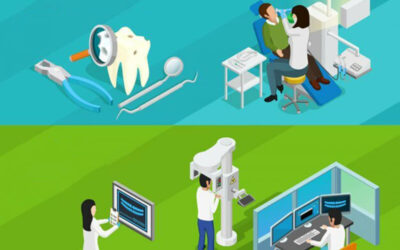Dentists are invariably entrusted with the responsibility of their patient’s oral health and well-being. However, patients also trust them to safeguard another significant aspect of their lives: their personal and health data. Unfortunately, even today, many dentists lack sufficient awareness about safely handling the latter.
Dental schools, while offering excellent clinical training and exposure, oftentimes overlook this aspect of healthcare and provide no appreciable training for handling patient data. As the world continues to take extensive strides towards a paperless reality, with enhanced efficiency and accessibility of Electronic Health Records (EHR) comes greater risk.

Why are patient records so vulnerable today?
At the dawn of the 21st century, a new kind of theft began to cause panic among law enforcement officers. Criminals began to steal the personal information of individuals and commit unauthorized transactions on their behalf; hence a new term was coined: Identity Theft. The higher the volume of information procured about the individual, the easier it was to steal their identity.
Healthcare records contain an extensive amount of personal information, right from the date of birth and current residence, to the underlying health conditions and vulnerabilities of the patient. A study conducted in 2017 and published in the Journal of the American Medical Association (JAMA) analyzed the nature of 2149 individual breaches that compromised a whopping 170 million medical records. The study concluded that despite ethical and legal mandates like HIPAA (Health Insurance Portability and Accountability Act, 1996) in the US, there had been an increasing number of breaches in the privacy of patient health data.
Despite the recent boom in healthcare data-driven analytics and solutions, with big names like AWS stepping into the game, legislation to safeguard patient data privacy continues to seem inadequate, especially in India.
An expert from Protenus, a company that analyzes healthcare data breaches, commented: “This (rise in healthcare data breaches) is an alarming trend which should change as more organizations deploy advanced patient privacy monitoring systems that can prevent future incidents.”

What can you do as a dentist?
“With great power comes great responsibility”, as dentists, it is our responsibility to safeguard every patient`s data. Here are a few steps you can take to ensure it:
- Knowledge is power: Train yourself and your clinic staff about patient data maintenance and confidentiality.
- Consider taking a cybersecurity survey from reliable sources to assess the vulnerability of your system.
- Use a Password Manager Tool to create strong passwords that are not easy to guess.
- Keep your system and patient data files password protected.
- Make sure that all systems containing patient data connect to secure and reliable networks only.
- Keep your patient`s data backed up in multiple secure locations, both online and offline.
- Avoid using clinic computers for purposes other than billing and patient data-keeping.
- Beware of ransomware. Do not download or click on content from untrustworthy sources.
- For multi clinic organizations, with interconnected patient record maintenance systems, consider hiring an IT professional who is well versed in data security.
- To keep physical patient records protected, install CCTV cameras at all entrances.
- Invest in good-quality locks. Lock the cabinets or drawers containing patient records prior to closing time.
- To prevent break-ins, hire dedicated security personnel who are posted 24*7 on the clinic premises.
- Have your clinic insured against thefts, fires, and other adverse events.
- Inquire with your insurance provider if they offer policies that cover data breaches. If yes, consider opting for them.
All dentists are superheroes. Our superpower? Preserving people`s smiles! This is why we should keep the Peter-Parker Principle in mind, each time a patient entrusts us with their personal information.
Highlights
- Patient concerns about safety must be dealt with and valuing their experience will keep your clinic running.
- Educate your patients about the steps you are taking to keep their dental records safe.
- An increasing reliance on electronic health records, while having countless benefits, also makes patient data highly vulnerable to a security breach.
- Educating oneself and one`s clinic staff about data confidentiality is crucial.
- Experts know best: Consider consulting an IT professional well versed in data security while setting up your clinic system.
- Avoid using clinic computers that store patient data for personal purposes or with unsecured networks.
- Hire security personnel from reliable firms, who are posted 24*7 in the clinic premises.
- Keep your clinic insured against theft, fires, and data breaches.





0 Comments